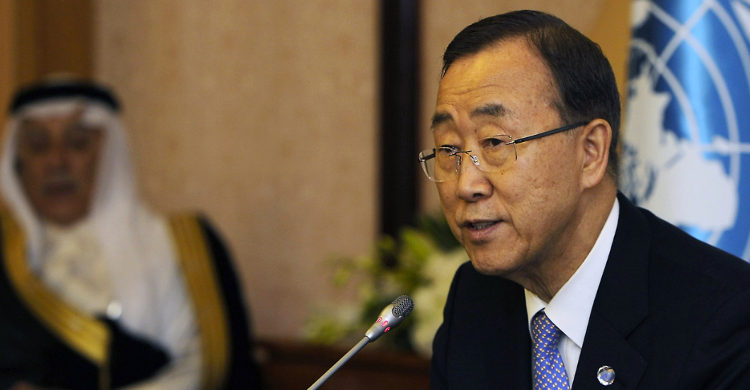ONU/Junio 2016/Autor: Alex Emmons and Zaid Jilani / Fuente: The Intercept
Resumen: Secretario General U.N., Ban Ki-moon, reconoció públicamente el jueves que eliminó a la coalición liderada por Arabia Saudita de una lista negra de asesinos de niños, de actualmente bombardear Yemen -72 horas después de que se publicó- debido a una amenaza financiera para cortar los fondos para los programas de las Naciones Unidas.
U.N. Secretary-General Ban Ki-moon publicly acknowledged Thursday that he removed the Saudi-led coalition currently bombing Yemen from a blacklist of child killers — 72 hours after it was published — due to a financial threat to defund United Nations programs.
The secretary-general didn’t name the source of the threat, but news reports have indicated it came directly from the Saudi government.
The U.N.’s 2015 “Children and Armed Conflict” report originally listed the Saudi-led coalition in Yemen under “parties that kill or maim children” and “parties that engage in attacks on schools and/or hospitals.” The report, which was based on the work of U.N. researchers in Yemen, attributed 60 percent of the 785 children killed and 1,168 injured to the bombing coalition.
After loud public objections from the Saudi government, Ban said on Monday that he was revising the report to “review jointly the cases and numbers cited in the text,” in order to “reflect the highest standards of accuracy possible.”
But on Thursday, he described his real motivation. “The report describes horrors no child should have to face,” Ban said at a press conference. “At the same time, I also had to consider the very real prospect that millions of other children would suffer grievously if, as was suggested to me, countries would defund many U.N. programs. Children already at risk in Palestine, South Sudan, Syria, Yemen, and so many other places would fall further into despair.”
Saudi Arabia is one of the U.N.’s largest donors in the Middle East, giving hundreds of millions of dollars a year to U.N. food programs in Syria and Iraq. In 2014, Saudi Arabia gave $500 million — the largest single humanitarian donation to the U.N. — to help Iraqis displaced by ISIS. Over the past three years, Saudi Arabia has also been become the third-largest donor to the U.N.’s relief agency in Palestine, giving tens of millions of dollars to help rebuild Gaza and assist Palestinian refugees.
“It is unacceptable for member states to exert undue pressure,” the secretary-general said. “Scrutiny is a natural and necessary part of the work of the United Nations.”
Ban called the decision “one of the most painful and difficult decisions I have had to make.”
Saudi Ambassador to the U.N. Abdallah al-Mouallimi, who held his own press conference afterward, offered his own back-handed confirmation of what happened. “We didn’t use threats,” he said, “but such listing will obviously have an impact on our relations with the U.N.”
“It is not in our style, it is not in our genes, it is not in our culture to use threats and intimidation,” he concluded.
Ban has invited a team from the Saudi-led coalition to New York to conduct a “joint review” ahead of scheduled U.N. discussions on the report, scheduled for August.
On Monday, however, after the changes were announced, the Saudi ambassador to the U.N. declared that the changes were “final and unconditional” and that Saudi Arabia had been “vindicated.”
Fuente de la noticia: http://readersupportednews.org/news-section2/318-66/37387-un-chief-admits-he-removed-saudi-arabia-from-child-killer-list-due-to-extortion
Fuente de la imagen: http://readersupportednews.org/images/stories/article_imgs21/021400-ban-ki-moon-061116.jpg







 Users Today : 4
Users Today : 4 Total Users : 35460307
Total Users : 35460307 Views Today : 5
Views Today : 5 Total views : 3419033
Total views : 3419033